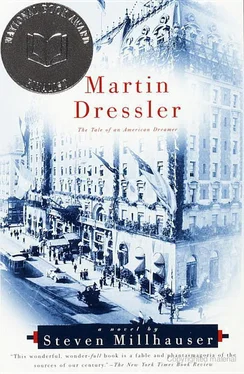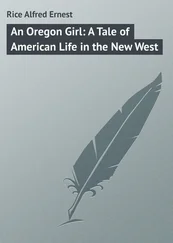One morning as Martin was riding up to the fifth floor to inspect a newly decorated parlor-and-bedroom suite, the elevator boy stopped at the fourth floor and opened the car for a handsome woman in a black coat and black hat who asked the boy if the car was going down. When she learned it was going up, she entered with a look of such irritation and impatience that Martin said, “Take us down, Howard. I’m in no hurry.” He was in fact in a hurry. The woman glanced at him sharply and said nothing , but at the ground floor she turned to him and said, “I appreciate your consideration,” and gave him a searching look before striding out of the car. He had seen her once or twice in the lobby, sitting in a straight-backed chair and glancing at the lobby clock. The next day he saw her at a desk in a writing room, and the day after that he met her on the stairs, which he was climbing two at a time. “If you have a minute, Mr. Dressler,” she said, “I need to discuss something with you. Kindly follow me.” He wondered, as he followed, whether she had known who he was all along or whether she had made it her business to find out. In her parlor she turned to give him the same searching look he remembered from the elevator, a penetrating and almost imperious look that seemed to be asking a question and making a demand. A sense of marvelous danger hung in the air. Martin, tense with energy, followed her into the bedroom, where she turned with a look of challenge. He was surprised by the length of her forearms, by the matting of blond hairs on her stomach, and by a kind of cool, wary ardor; she kept her combs in her hair and scarcely moved under him, though he noticed a line of dampness by the hair of her temple. Her long satiny body reminded him of a splendid bridge or a high, glittering steel beam swinging through the air. When he saw her later that day, sitting upright in the lobby, in a dark blue dress and small hat with a half veil, she gave him a quick hard smile and averted her eyes. The veil made it seem as if the upper part of her face were dissolving. He became aware that he had stopped and was looking at her, and immediately he continued across the lobby to the front desk, where Emmeline said, “I hope you’re not falling in love with her too.”
“I like that ‘too,’” Martin said.
“Oh, we’re all in love with her, aren’t we, John. She looks like some wonderful sort of panther.”
“Yes ma’am,” said John Babcock with a tight smile.
An odd shame came over Martin, who suddenly disliked the thought of himself and the woman, her long forearms, the line of dampness at her temple; he disliked having to conceal these details from Emmeline. He glanced over at the lobby, but the woman was no longer there.
“She vanishes,” Emmeline was saying. She lowered her voice melodramatically. “The ghost of the Vanderlyn.” Martin saw her staring at him, her eyes shining with innocent mischief, with pleasure; some instinct in her had penetrated his secret, though she herself knew nothing about it. And an irritation came over him at her ferreting out his secret and not knowing it, at his many wives, all sliding into one another, at the vanishing woman who now reminded him a little of Caroline, despite the broad shoulders, for the pale hair at the temples was Caroline’s hair and the look of slight strain between the eyes was Caroline’s look. Then she was an emissary of Caroline’s, sent by her to trap him on the stairs.
“So long as she doesn’t vanish without paying for her room,” he said.
That night he felt a slight awkwardness on seeing Caroline, an awkwardness immediately replaced by irritation as she failed to ask him about his day, for he thought he might have confessed to her what he had done. But she was tired, a tiredness came over him at her tiredness, and he slipped as if comfortably into his marriage tiredness, waking for only a moment to notice a faint change, a little hairline fracture in the smooth surface of his marriage, through which other women might now enter, even if they were only emissaries of Caroline, ghost-Carolines who lured you into a room and turned to place both hands on your shoulders as they began to dissolve under the blue mist of their veils.
As the official date for the completion of the New Vanderlyn and the opening of the Vanderlyn Bazaar drew near, Martin was seized with restlessness. The New Vanderlyn gave every promise of success. The last block of rooms had been reserved far in advance, the new bathroom fixtures were praised by every guest, the grand old lobby had been skillfully remodeled with period furniture meant to summon up the amenities of a vanished past and with new steam radiators hidden behind Japanese screens, people in the street stopped in to inquire about the Vanderlyn Bazaar, and though Martin had no doubt of the success of his venture, he was aware of a sense of impediment, of dissatisfaction. His feeling reminded him of something, and one morning as he walked from the El station to the Vanderlyn and passed a cigar store it came to him: he recalled standing in the window of his father’s store, stepping among the neat wooden boxes of cigars. What the window had needed was a dramatic new treatment, an eye-striking all-new display, but hampered by the heaviness of his father’s disapproval, by the sheer weight of things-as-they-were, he had produced his inadequate cigar tree. Now he had created the New Vanderlyn, a far better cigar tree, a successful cigar tree that was going to make a success of the old hotel — but in truth he was still stepping carefully among the neat cigar boxes.
One afternoon not long after the official opening of the New Vanderlyn, in October 1897—it had been a success, as he had known it would be, and the shops of the Vanderlyn Bazaar were bursting with business — Martin rode uptown on the Sixth Avenue Elevated, which above Fifty-third Street continued along the double track it shared with the Ninth Avenue line. He did not get off until the station at Ninety-third Street. It was a clear cold blue day. He walked toward the river and then turned uptown along the winding avenue that ran along the park. It was rumored that an apartment house would soon rise among the stone mansions of the avenue, but blocks of vacant lots and high rocky outcroppings still gave a touch of wildness that invigorated him. On a sloping side street he stopped at a hoarding and looked over the rough boards at an excavation in progress. A yellow steam shovel sat at the bottom of a pit of blasted rock and hard-looking chalky dirt. The dipper handle of the shovel swung slowly and stopped over a truck heaped with dirt and rocks. Dirt poured from the dipper and slid down the sides of the heap in the truck. A dark horse with a dirty white mane that looked like thick pieces of yarn snorted as it lifted and lowered a hoof. A workman in a blue wool cap sat on a rock eating an apple. Perhaps because of the cold clear air and the clear blue sky, Martin had the sense that he could see things very clearly: the woolly yellowish-white hairs in the horse’s mane, the workman’s reddish hand matted with yellow hairs, wheel ruts in the dirt ramp leading down to the pit, the shadowed hole drilled in a boulder for a stick of dynamite, the glistening black letters of the company name on the yellow cab of the steam shovel, the smokelike rippling shadow cast on the rocky dirt by bursts of steam from the shovel’s stack. He felt clear and clean and calm. You dug into the ground and made a hole, and from that hole a building grew — or a wondrous bridge. In his childhood, workmen had been lowered to the bottom of the East River in two great wooden caissons, and from there they had dug down through mud and clay and sand and boulders to a depth of more than forty feet. From those two holes under the river the towers of the great bridge had slowly risen up, block by granite block. Now buildings with frames of steel were rising above the height of the mighty bridgetowers. All across the city steam shovels were digging, truck horses pulling, boom derricks swinging. The edge of a pink poster flapped on the fence. Steam poured from the shovel, the truck horses snorted and stamped, a small bird lit on the hoarding and at once rose up, flying higher and higher into the bright clear sky.
Читать дальше












